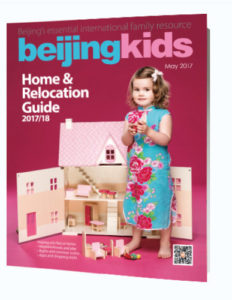Relatively affordable domestic help is one of the luxuries of expat life in China. Not only do ayis (as nannies and cleaners are known in Beijing) provide invaluable support for any family, their services can be downright liberating for new parents and those with limited mobility. Many families develop a bond with their ayi beyond that of employer and employee; time and time again, long-term expats have told us that the hardest part of leaving Beijing was separating from their ayi.
Beyond domestic chores, ayis can also soften the effects of culture shock by helping families navigate some of the more challenging aspects of living in Beijing: dealing with repairmen, tracking down missing parcels, sourcing hard-to-find ingredients, etc.
While personal drivers are often assigned to executives by their company, ayis will almost always be hired by the family, either directly or through an agency. The interview is a crucial part of the process, so it is a good idea to ask someone to act as a translator so that both you and the prospective ayi are clear about expectations and benefits.
In general, June and December are the best times to look for domestic help because many employment contracts are up around then. The best way to start your search is through word-of-mouth. Finding an ayi with the kinds of qualifications needed to serve an expat family – the ability to work full-time, cook, clean, take care of children and pets, and perhaps speak basic English – can be difficult, so getting in touch with other parents can save considerable time.
Start by asking around school or parenting-focused WeChat groups, expat forums, and Yahoo groups (e.g. the Beijinger, beijingkids, Beijing Mamas, Beijing Exchange, etc.). Families leaving Beijing often post advertisements vouching for their ayi while others post on behalf of ayis looking for additional work.
These forums are also a valuable source of information on the benchmark for typical working hours, average pay, overtime rates (if any), and the range of duties ayis can be expected to perform.
Online classifieds are also a research avenue, but ads are often posted by ayi recruitment agencies and will require more sifting through. The building and compound management office can sometimes provide leads or recommendations for ayis that residents have employed in the past. Ayis themselves often leave advertisements on billboards at businesses often frequented by expats, such as April Gourmet or Jenny Lou’s.
Once you have a list of applicants, start by checking their references. Do not hesitate to contact previous employers and ask as many questions as necessary; the ayi will have a significant place in your family’s life, so find out exactly what you want to know. Determine the qualifications that are most important to you and ask about the ayi’s experience and performance in these areas. If you need help with childcare, a history of looking after expat kids is a must. If you need someone to do the groceries and cook, a repertoire that goes beyond simple Chinese dishes might also be beneficial.
Once it is time to interview prospective ayis, be candid, clear, and thorough (see next page for questions to ask). The interview also provides a good opportunity to see how much English the applicant speaks, if any. It is perfectly reasonable to ask the prospective ayi to go through a trial, such as preparing a meal or cleaning. It is customary to pay the applicant a day rate for any trial; determine the amount with them ahead of time.
Questions to consider include:
● How much time will the ayi have off for Spring Festival and other national holidays?
● Will they receive a guaranteed bonus (often referred to as a “13th-month bonus”)? Many ayis will expect this.
● Will the ayi receive full salary while you are away on vacation?
● Will you need the ayi to travel with you, including out of the country?
What About Ayi Agencies?
If you are short on time, an ayi agency can significantly simplify the process of finding domestic help, but this requires a careful evaluation of the agency first. Your company may be able to recommend a vetted agency.
However, keep in mind that using an agency will likely be more expensive and possibly carry higher ayi wages, though it is much simpler to change ayis if you are not satisfied with the first one. Agencies usually require a membership or management fee, but the monthly wage should go directly to the ayi. Make sure to clarify how the fees are split between the agency and the ayi. Agency websites are a great resource for pay ranges, which are clearly outlined according to qualifications, language ability, hours and other criteria.
Going through an agency can take some of the guesswork out of the process, with background checks, health checks, and training sometimes included. During the interview stage, use your own translator rather than one provided by the agency. Monthly wages for a full-time, English-speaking ayi range from RMB 3,800-7,000.
Establishing Expectations
Besides setting expectations for everyday tasks, it is crucial to discuss holiday policies during the interview stage. If you go through an agency, it is possible they have their own policies concerning holiday leave and pay.
Ayi Training
Invest in your ayi. Our ayi had previous employers who paid for her English classes, and now she reaps the benefits and can charge more an hour for her services. We decided to teach her western cooking so she can take this with her to the next employer when we leave. This will allow her to continuously upgrade her CV as she works for us.
Different ayis have different strengths and experiences. Expect to spend some time showing them what “clean” means to you. At the beginning, demonstrate down to the cleaning product how you would like cleaning tasks to be done, including laundry, ironing, and tidying.
If you are interested in a particular posting or referral, contact the candidate immediately; good ayis are always in demand. Remember, if you’re happy and your ayi is happy, that’s all that really matters. It may take several tries to get it right, but putting in the effort to find and train your ayi will benefit all those concerned.
Keeping Your Ayi
Consider her workload and pay her accordingly. If you have six kids, make sure to pay her extra, and always make sure she is happy with her position. Be the employee you would want to work for, and don’t advertise the fact you have a great ayi to others.
Ayi and Driver Checklist
Questions to consider when hiring an ayi:
Does she speak English? If so, how well?
Do you want her to speak English with your children or help them improve their Mandarin?
Has she worked for expat families before? If so, were their customs and background similar to yours?
Has she undergone a recent health check? If not, you may want to insist she does so, although you would have to cover the cost.
Is she certified in CPR and first aid?
How old were the children she has cared for in the past?
Does she have any experience caring for babies?
Is she available for babysitting and/or on weekends?
Does she have any experience looking after pets? Does she have any allergies?
Do you need her to cook? Do you want her to cook western food?
Do you want a live-in ayi? If so, what are her needs and can you accommodate them?
Does she live close by? This can affect her availability, should you need her for emergencies or occasional babysitting duties.
Do you want a trial period? This can range from three weeks and upwards of three months.
Is she trustworthy? Was she referred to you by a friend?
If the ayi is to have keys to your house, is she willing to give you a photocopy of her Chinese ID card?
What do you want your ayi to do? Be specific about her daily tasks, as well as a list of additional tasks such as looking after the children at birthday parties.
Discuss all aspects of money and leave, including pay, overtime, raises, bonuses, holiday leave, and sick leave.
Questions to consider when hiring a driver:
● How many years of experience does the applicant have as a personal driver?
● Do you need them to speak English?
● Do they have previous experience with expat families?
● Have they ever been involved in an accident?
● What kind of car do they drive?
● How much will their salary be? Will there be overtime pay?
● How much will their annual bonus be?
● What will be their standard working hours?
● What holidays will they be entitled to? With full or reduced pay?
● How well do they know the city and suburbs?

This article originally appeared on p 36-37 of beijingkids May 2017 Home & Relocation Guide.
Download the digital copy here.




